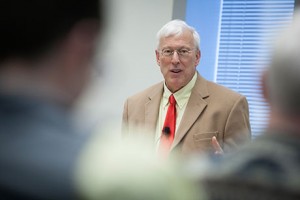
Robert Sternberg, professor of human development, speaks about his new book "The Modern Land-Grant University" during a Feb. 10 Sesquicentennial Lecture in Mann Library.
By Abigail Warren
Reprinted from Cornell Chronicle, Feb. 12, 2015
Robert Sternberg called on American universities to re-examine their goals and apply land-grant values to their admissions and teaching in a Feb. 10 Sesquicentennial Lecture in Mann Library.
A psychologist and professor of human development at Cornell, Sternberg spoke about his 2014 book, “The Modern Land Grant University,” and drew on his administrative experience at Tufts and Yale universities and the University of Wyoming to discuss problems in U.S. education.
The Morrill Land Grant Acts of 1862 and 1890 granted federal land to the states for them to sell and raise funds to establish land-grant colleges, whose missions include service and community engagement.
Despite outstanding land-grant universities like Cornell, Sternberg said, many private and public institutions fail to use admissions and teaching models that emphasize engaged, applied and creative learning.
“Many private institutions, when they admit students, focus on entry value. How high are SATs, grades, etc.,” Sternberg said. “Land grants’ emphasis is on value added. They ask, ‘How much can we add to the student and [how much can] this student add to the university and the world?’”
Sternberg said land-grant universities adhere to values and “have a broad sense of what abilities are [in the admission process].” In contrast, many private universities focus on test scores that measure analytical skills and memory.
Competitive universities often admit students with high GPAs and SAT scores who lack creativity, Sternberg said. While analytical and memory skills are important, he said, top students and leaders need to be urged to develop other leadership skills to be “world changers.”
“We want to build ethical leaders who have the creative skills and attitudes to generate new ideas; the analytical skills to ensure that the ideas are good ones; the practical skills to implement their ideas and persuade others of the value of these ideas; and the wisdom-based skills to ensure that the ideas help to achieve a common good, through the infusion of positive ethical values.” Land-grant universities like Cornell, he said, are taking notable strides to do so.
An experiment Sternberg launched at Tufts called the Kaleidoscope project changed the admissions application to include optional creative, analytical, practical and wisdom-based questions to measure a wider array of abilities.
Responses to the Tufts admissions application were predictors of extracurricular and leadership success and did not show significant differences between ethnic groups as traditional test scores do. Sternberg said a wider diversity of abilities often correlates with greater ethnic diversity.
“Land-grant universities may take students with a broader range of SAT scores, because their mission is to get the students who are going to make the university and world a better place. These are the students who are not just good scholars, but the future leaders who will enrich their societies.”
Abigail Warren ’15 is a writer intern for the Cornell Chronicle.



